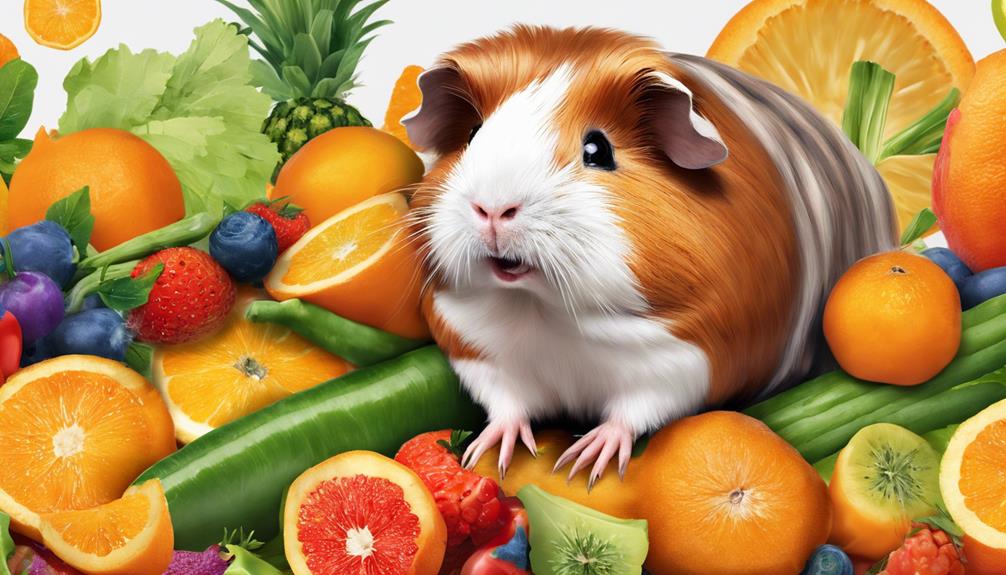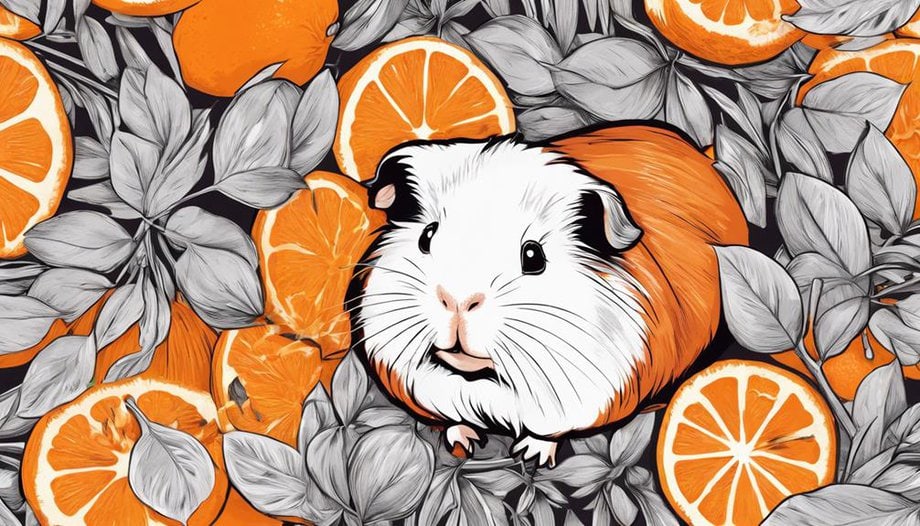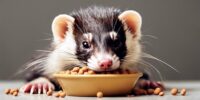Why Adequate Vitamin C Is Crucial for Guinea Pig Health

Vitamin C is essential for guinea pigs as they are unable to produce it on their own. Without enough vitamin C, guinea pigs can develop a condition called scurvy, which can be life-threatening. It is crucial for their overall health and well-being to provide them with a diet rich in vitamin C. This can be achieved through feeding them fresh fruits and vegetables high in this nutrient, such as bell peppers, kale, and strawberries. Regularly monitoring their vitamin C intake is important to ensure they stay healthy and happy.
Guinea pigs rely on us as their caregivers to provide them with the necessary nutrients they need to thrive. By understanding the importance of vitamin C and incorporating it into their diet, we can help prevent potential health issues and ensure a better quality of life for our furry friends.
Key Takeaways
- Vitamin C is essential for guinea pigs as they cannot produce it themselves.
- Deficiency leads to life-threatening scurvy, emphasizing the crucial need for adequate intake.
- Fresh produce like bell peppers and kale are vital sources for maintaining optimal health.
- Owners must ensure proper supplementation and diet to prevent deficiencies and support overall well-being.
Vitamin C Deficiency in Guinea Pigs
Vitamin C deficiency in guinea pigs poses a critical health risk that mustn't be underestimated. These small, lovable creatures, like humans, are unable to synthesize Vitamin C endogenously, making it essential to provide this nutrient through their diet. Guinea pigs, prone to various illnesses, rely heavily on adequate Vitamin C intake for robust health. When deprived of this essential nutrient, guinea pigs can suffer from scurvy, a potentially fatal condition.
To prevent such afflictions, it's important to understand the nuances of Vitamin C absorption in guinea pigs. Unlike other animals, guinea pigs have a limited capacity for absorbing Vitamin C, with absorption rates varying based on factors such as age, weight, and overall health. Therefore, ensuring that these delightful pets receive a diet rich in Vitamin C is paramount.
Treatment for guinea pig illnesses related to Vitamin C deficiency often involves immediate supplementation and dietary adjustments to restore their health and vitality. Remember, vigilance in providing adequate Vitamin C can significantly enhance the well-being of our beloved guinea pig companions.
Signs of Vitamin C Deficiency
Guinea pigs suffering from inadequate levels of Vitamin C manifest distinctive signs that indicate potential deficiency. Common symptoms of Vitamin C deficiency in guinea pigs include lethargy, rough coat, swollen joints, and reluctance to move or eat. These delicate creatures heavily rely on external sources for their Vitamin C intake, making them prone to deficiencies if not provided with a proper diet.
When these signs appear, immediate treatment is vital. Introducing Vitamin C-rich foods such as bell peppers, kale, or providing Vitamin C supplements can help reverse the deficiency and alleviate symptoms. However, prevention is essential to guarantee ideal health for guinea pigs.
To prevent deficiencies, a well-balanced diet containing fresh vegetables, fruits, and commercial guinea pig pellets fortified with Vitamin C is vital. Regularly monitoring their Vitamin C intake and observing for any signs of deficiency can aid in early detection and prompt intervention. By prioritizing their nutritional needs, guinea pig owners can guarantee the well-being and longevity of their beloved pets.
Importance of Proper Guinea Pig Nutrition

Ensuring a well-rounded diet is important for maintaining the best health and vitality of guinea pigs. A guinea pig's nutritional balance and dietary variety play a critical role in supporting its overall well-being. Here are four key aspects highlighting the importance of proper guinea pig nutrition:
- Nutritional Balance: Providing a balanced diet ensures that guinea pigs receive all the essential nutrients necessary for their growth and development.
- Dietary Variety: Offering a diverse range of vegetables, fruits, hay, and pellets helps prevent nutrient deficiencies and keeps guinea pigs engaged and interested in their food.
- Supporting the Immune System: Proper nutrition strengthens the guinea pig's immune system, making them more resilient to illnesses and infections.
- Antioxidant Properties: Certain foods high in Vitamin C and other antioxidants help protect guinea pigs from oxidative stress and improve their overall health.
Sources of Vitamin C for Guinea Pigs
Guinea pigs have specific dietary requirements for Vitamin C to maintain their health and well-being. Fresh vegetables and fruits such as bell peppers, kale, and oranges are excellent natural sources of Vitamin C for these small pets.
In cases where guinea pigs may need additional supplementation, Vitamin C supplements specially formulated for them can be considered as part of their diet.
Dietary Vitamin C Requirements
A vital aspect in maintaining peak health for guinea pigs involves ensuring they receive sufficient dietary sources of vitamin C. Guinea pigs, unlike humans, can't synthesize vitamin C endogenously; thus, it's crucial to provide this essential nutrient through their diet.
To meet their dietary vitamin C requirements effectively, consider the following:
- Timely Supplementation: Ensure a consistent intake of vitamin C-rich foods to prevent deficiencies.
- Balanced Diet: Offer a diverse range of vegetables and fruits to cover all nutritional bases.
- Freshness Matters: Opt for fresh produce to maximize vitamin C content.
- Consult a Vet: Seek guidance from a veterinarian for tailored dietary recommendations.
Fresh Vegetables and Fruits
To maintain prime health for guinea pigs, one must prioritize incorporating fresh vegetables and fruits rich in vitamin C into their diet. Nutrient-rich options like bell peppers, kale, and strawberries are excellent choices to guarantee an adequate intake of this important vitamin.
Meal planning plays a critical role in providing a balanced variety of vitamin C sources for guinea pigs. It's important to offer a diverse selection of fruits and vegetables to meet their dietary requirements. However, portion control is equally important to prevent overconsumption, which can lead to health issues.
Vitamin C Supplements
In ensuring peak health for guinea pigs, it's imperative to carefully consider the sources of Vitamin C supplements available to support their dietary needs effectively. Guinea pigs require a consistent intake of Vitamin C due to their inability to produce it naturally. When selecting Vitamin C supplements for guinea pigs, consider the following:
- Quality: Choose supplements specifically formulated for guinea pigs to ensure optimal absorption.
- Dosage: Follow recommended dosages to prevent overdosing or underdosing.
- Freshness: Opt for fresh supplements to guarantee maximum potency and effectiveness.
- Variety: Provide a variety of sources such as tablets, liquid drops, or fortified pellets to cater to individual preferences and needs.
Selecting the right Vitamin C supplement is vital for maintaining your guinea pig's health and vitality.
Recommended Daily Intake for Guinea Pigs
Guinea pigs have specific daily vitamin C requirements critical for their overall health and well-being. Understanding the importance of meeting these needs can greatly impact a guinea pig's longevity and quality of life.
Exploring the various dietary sources that fulfill this requirement is essential for maintaining top health in these beloved pets.
Daily Vitamin C Needs
Understanding the daily vitamin C needs of guinea pigs is important for maintaining their overall health and well-being.
- Daily Requirement: Guinea pigs require approximately 20-30 mg of vitamin C per day to prevent deficiency.
- Absorption Factors: Factors like stress, illness, and age can impact vitamin C absorption and metabolism in guinea pigs.
- Fresh Food Sources: Fresh vegetables like bell peppers, kale, and parsley are excellent sources of vitamin C for guinea pigs.
- Supplementation: If dietary sources are insufficient, vitamin C supplements specifically formulated for guinea pigs can be administered to meet their daily needs.
Health Benefits Overview
Exploring the myriad health benefits of maintaining the recommended daily intake of vitamin C for guinea pigs reveals a vital aspect of their overall well-being. Adequate vitamin C supports guinea pigs' immune system, providing them with essential immune support and antioxidant benefits.
Additionally, this essential nutrient plays a key role in collagen production, which is essential for wound healing and maintaining healthy skin. By ensuring that guinea pigs receive the recommended daily intake of vitamin C, owners can actively contribute to the overall health and vitality of their beloved pets.
Prioritizing this aspect of care showcases a commitment to their well-being and longevity, underscoring the importance of meeting their specific dietary requirements for the health and well-being of guinea pigs.
Dietary Sources Importance
The foundation of excellent health for guinea pigs lies in sourcing and providing adequate dietary sources rich in vitamin C to meet their recommended daily intake. Guinea pigs can't synthesize vitamin C endogenously, making it essential to supply it through their diet.
Here are four key points to make certain:
- Fresh Vegetables: Offer a variety of fresh vegetables daily, such as bell peppers, kale, and broccoli, to guarantee a sufficient intake of vitamin C.
- High-Quality Pellets: Choose high-quality guinea pig pellets fortified with vitamin C to supplement their diet.
- Avoid Overcooking: Overcooking vegetables can lead to vitamin C loss; opt for raw or lightly cooked options.
- Rotate Fruits: Incorporate fruits like strawberries and oranges into their diet rotation for added vitamin C benefits.
Health Benefits of Vitamin C
Vitamin C plays a vital role in maintaining prime health by supporting the immune system and promoting overall well-being. This essential nutrient aids in immune support, helping guinea pigs ward off illnesses and infections. Additionally, vitamin C contributes to skin health, assisting in collagen production for healthy skin and fur. Furthermore, its antioxidant role protects cells from damage caused by free radicals, ensuring optimal bodily function. In the context of wound healing, vitamin C is vital as it aids in the formation of scar tissue and helps repair tissues after injuries.
| Health Benefits of Vitamin C | Description |
|---|---|
| Immune Support | Aids in boosting the immune system to fight off infections and diseases. |
| Skin Health | Supports collagen production for healthy skin and fur. |
| Antioxidant Role | Protects cells from damage caused by free radicals. |
| Wound Healing | Assists in tissue repair and scar formation after injuries. |
Risks of Vitamin C Overdose

Excessive intake of vitamin C can lead to adverse health effects in guinea pigs. While this essential nutrient is essential for their well-being, an overdose can pose risks that must be considered. Here are four key points to keep in mind:
- Digestive Issues: Too much vitamin C can cause gastrointestinal problems such as diarrhea and bloating in guinea pigs, leading to discomfort and potential nutrient malabsorption.
- Kidney Stones: High levels of vitamin C can increase the risk of kidney stones in guinea pigs. These stones can obstruct the urinary tract, causing pain and potentially serious complications.
- Joint Pain: Overdosing on vitamin C may contribute to joint pain and stiffness in guinea pigs, affecting their mobility and overall quality of life.
- Interference with Other Nutrients: Excessive vitamin C intake can interfere with the absorption of other essential nutrients, disrupting the delicate balance needed for best health in guinea pigs.
Tips for Ensuring Adequate Vitamin C
Guarding against potential risks, maintaining peak vitamin C levels in guinea pigs requires a thoughtful approach that secures their well-being and vitality. To confirm adequate vitamin C intake for these adorable pets, incorporating vitamin C-rich treats into their diet can be a delightful and effective strategy. Fresh fruits such as oranges, strawberries, and bell peppers can be enticing options that boost their vitamin C levels while offering a tasty treat.
In addition to incorporating vitamin C-rich treats, employing creative feeding strategies can also help guarantee that guinea pigs receive their necessary dose of this essential nutrient. For instance, mixing vitamin C supplements with their water or sprinkling it over their vegetables can confirm they consume an adequate amount daily. Rotating their diet with a variety of vitamin C sources can also prevent boredom and encourage consistent intake.
Frequently Asked Questions
Can Guinea Pigs Overdose on Vitamin C and What Are the Risks Associated With Excessive Consumption?
Guinea pigs can overdose on vitamin C, leading to potential toxicity. Signs of overdose include diarrhea and urinary issues. To prevent this, provide the recommended daily dosage, around 25-50mg, through veggies or supplements. Monitor for adverse effects.
Are There Any Specific Fruits or Vegetables That Should Be Avoided When Trying to Supplement a Guinea Pig's Diet With Vitamin C?
In the quest for peak guinea pig health, it's wise to steer clear of vitamin C rich fruits like grapes and citrus. When supplementing, follow dos and don'ts diligently to guarantee your furry friends thrive.
How Can I Tell if My Guinea Pig Is Getting Enough Vitamin C From Their Diet Alone Without the Need for Supplements?
To know if a guinea pig gets enough Vitamin C from diet alone, observe for signs of deficiency like lethargy or rough coat. Make sure dietary sources like veggies are high in Vitamin C and consider supplements for prevention.
Are There Any Specific Factors That Can Affect a Guinea Pig's Ability to Absorb and Utilize Vitamin C Effectively?
Factors affecting absorption and utilization efficiency of vitamin C in guinea pigs include stress, illness, and dietary imbalances. These factors can hinder the body's ability to effectively absorb and utilize this essential nutrient, impacting overall health.
What Are Some Alternative Ways to Ensure My Guinea Pig Is Getting Enough Vitamin C if They Are Picky Eaters and Refuse Certain Foods High in This Nutrient?
When picky eaters turn their noses up at vitamin C-rich foods, consider vitamin C supplements. While beneficial, be wary of overdoing it. Get creative with feeding strategies – mix it in their water or incorporate it into treats.











